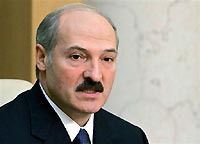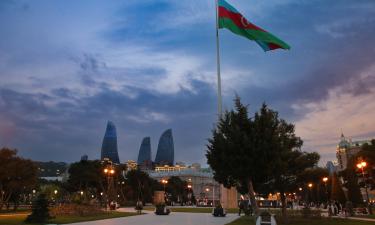Lukashenko's 'dictatorship' unacceptable for the West
 On Friday, January 21st, the inauguration of Alexander Lukashenko re-elected for the fourth Presidency term was hosted in Minsk. The ceremony was attended by delegations from 32 countries. The U.S. and EU countries have not sent their representatives. This is not surprising since in the last few days the West has been threatening Belarus with sanctions.
On Friday, January 21st, the inauguration of Alexander Lukashenko re-elected for the fourth Presidency term was hosted in Minsk. The ceremony was attended by delegations from 32 countries. The U.S. and EU countries have not sent their representatives. This is not surprising since in the last few days the West has been threatening Belarus with sanctions.
The current round of anti-Belarusian campaign in Europe began on Tuesday, when Poland introduced unilateral sanctions and the ban on Lukashenko's entry into the country. A day later the European Parliament adopted a resolution which called for a ban on entering the EU for all Belarusian officials implicated in the dispersal of an opposition rally on the night of December 19. Among other things, Belarus may lose its right to host the World Hockey Championship in 2014.
Lukashenko did not hesitate with the answer. On January 20, he accused Poland and Germany in the preparation of a coup in Belarus. "All programs and a huge portion of the money came from Germany and Poland, or via Germany and Poland. This is where the program of overthrowing the constitutional order was written. And this is not an invention of the security services. This is a testimony of those who organized it," said Lukashenko.
Meanwhile, on the night of January 21 the United States stated its intention to support sanctions against Belarus. "We support the EU and are ready to re-enact the sanctions against the Belarusian regime that have been previously lifted," said the spokesman of the State Department PJ Crowley. As a result, neither the Europeans nor the Americans appeared at the inauguration of Lukashenko. Yet, the ceremony was still held.
The European press is replete with articles denouncing Lukashenko. Polish edition of Gazeta Wyborcza and Rzeczpospolita quoted Foreign Ministry spokesman of Poland who denies all Lukashenko's accusation of Poland in the preparation of the coup. "The dictator replied to the West in his own way. But this is absurd, and is yet another step on the path of confrontation," said the Polish diplomat.
The above-mentioned Polish publications wrote about the fate of the Belarusian opposition. Gazeta Wyborcza said that the Belarusian authorities have decided to withdraw the works of the poet and opposition leader Vladimir Neklyaev from the bookstores. The headline was more than typical: "The dictator trembles before the poet." The Polish journalists did not dare to ask the representatives of the Belarusian authorities for comments to verify whether this incident has taken place in reality.
On its part, the German magazine Der Spiegel wrote that Germany rejects accusations of plotting the coup. Lukashenko's words about the possible involvement of German and Polish secret services in the coup were interpreted as follows: "This ruling authoritarian president accused Germany and Poland in the organization and financing of protests after the disputed presidential election".
The German edition engaged in contrasting Belarus's relations with the EU and Russia. "The relations between Lukashenko and the leadership in Moscow improved again after a dispute lasting several months. This may have contributed to the fact that after a cautious rapprochement with the West, Lukashenko ‘s relations with the European Union once again deteriorated," wrote Der Spiegel. In short, the Belarusian authorities are indirectly predisposed to the choice: either you are with Europe or with Russia. There is no other choice.
The Swedish newspaper Aftonbladet reminded its readers that, in addition to Poland and Germany, the authorities in Minsk accused Sweden of plotting the coup. It quoted the blog of Foreign Minister of the Scandinavian country Carl Bildt who said that the regime in Belarus started to throw absurd accusations.
Carl Bildt is not the last politician in Europe. In mid-1990's he was a mediator in the Balkans and strongly lobbied for the decision to bomb the Bosnian Serbs. In 2008, he was furious in his demands to punish Russia that allegedly committed aggression against Georgia. Now he seems to have found a new enemy - Lukashenko.
Austrian newspaper Der Standard was harsh in its evaluation of Lukashenko's behavior. It wrote that a month after the presidential election with their controversial results arrests and searches continue in the country. The newspaper wrote that the Belarusian authorities are resorting to methods that were popular during the Soviet dictator Stalin increasingly more. The publication did not talk about the fact that the opposition has repeatedly violated the law.
According to the British The Financial Times, the overall trend in the eastern Slavic countries is backsliding from the democracy. According to the newspaper, Belarus has intensified the crackdown on the political opposition following the recent elections, Ukraine is stepping back under the authority of Yanukovich, and Russian authorities are using harsh tactics against their political opponents. The author regrets that the EU does not have enough leverage to exert pressure on Russia, Belarus and Ukraine.
It is worth mentioning that the European media somehow "forgot" that until recently the EU regarded Lukashenko as a potential partner. He was invited in the EU 'Eastern Partnership' program, and was promised money. In all Russian-Belarusian disputes Western media often used to take the side of Minsk. Yet, Belarusian authorities were not democratic one or two years ago. However, as soon as Lukashenko stopped "butting heads" with Russia, he was raised to the status of a dictator again.
This time around Russia is not necessarily mentioned, but the subtext of anti-Russian statements of the Western officials and publications about Lukashenko in the western media is evident. They use comparisons with Stalin, compare Lukashenko with the "wrong" Vladimir Putin, and "pro-Russian" Viktor Yanukovich.
It is hardly likely that Western politicians and Western media are primarily interested in democracy; they just failed to make him "one of their own."
Vadim Trukhachev
Pravda.Ru
Subscribe to Pravda.Ru Telegram channel, Facebook, RSS!





